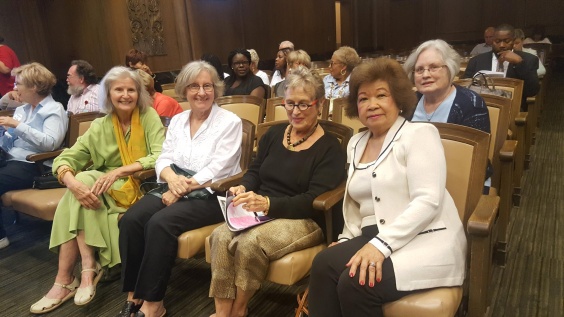Striving for Equal Pay: Coalition Building in Kansas City

Kansas City residents have long strived to eliminate gender discrimination and improve women’s rights as a way to build a healthier future for everyone. Local leader and social worker Alice Kitchen has been fueling this focus for decades. Kitchen advocates for a world where everyone enjoys economic security and women receive fair pay.
Even though the Equal Pay Act banned gender wage discrimination nearly 60 years go, on average, women still earn little more than 80 cents for every dollar white men make. In Jackson County, Missouri, which includes Kansas City, County Health Rankings & Roadmaps data finds that women earn about 81 cents for every dollar white men make.
In 2014, Kansas City, Missouri, passed the Cities for the Elimination of all forms of Discrimination Against Women resolution (CEDAW), a United Nations’ model for improving women’s rights. The city council then established the Women’s Commission and passed measures to close the gender pay gap. In 2021, Kitchen and others from the Women’s Equality Coalition reported on progress and improvements still to be made.

The city council also passed an ordinance to outlaw employers from using a job applicant’s salary history. The idea was to prevent a practice known as anchoring, or using a low salary in one job to set the bar for low earnings in the next job. Scott Wagner, a former city council member who sponsored the ordinance, said women, many of whom made sacrifices to step out of the workforce to care for family, were disproportionately affected by the practice. He wanted women to be paid “based on the responsibilities that they were accepting, rather than rely on a salary history that could hinder them.”
“This may have been one of the most far-reaching things I ever did in elected service. I’ll always be grateful for Alice’s persistence in getting me engaged in this issue,” Wagner said.
For Kitchen, the work continues. Most recently, she has worked with Stand Up Kansas City to organize fast food and retail workers. Ultimately, they hope to create a union for these workers so they can receive living wages and other benefits such as paid leave to support women’s ability to stay in the workforce.
“When employees have more control in their jobs, they have more control in their lives and are happier … and it’s good for not just women, but all people and families,” Kitchen said.
To learn more about the gender pay gap:
- Read about the gender pay gap in our data spotlight, which includes an interactive map
- Listen to the most recent collection of podcast episodes on In Solidarity
- Read our 2022 County Health Rankings National Findings Report
- Learn how your community can join Cities for CEDAW

